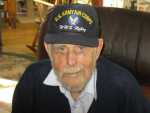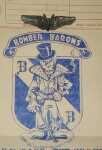The Bomber Barons

By Colette Lefebvre-Davis
Herald-Tribune
Nevada, Mo. -- Ivan J. Ostrander has lived in Missouri for 20 years. He was born in Pittsfield, Mass., in 1917, and Ostrander's life has been far from dull.

World War II shook the globe and the nation, and Ostrander remembers the day he was drafted.
"At the county seat they had a stack of papers about an inch thick. My name was on the second to the last page," he said.
In that time, the draftees were picked by "fishbowl," with names placed in and randomly drawn out.
During his service, he went all over the states, and received a lot of training. Ostrander, was a Cadet in the Army Air Corps, went to radio school, learned radar techniques and then became a gunner. His two brothers were also in the war, one stationed in the South Pacific, and the other in Europe.
His father had lost his horse at the time Ostrander was drafted, so he lent his father his truck so that he could tend to his dairy farm uninterrupted.
"Well, I received a letter saying that the draft board needed my truck. I explained to them that my father needed it. Then again, they sent me another letter saying that they needed the truck and I better give it to them or they would put me in Sing-Sing, I said, 'listen, you have me and you have my brother, you have enough.'"
But, they came and took his truck anyway, though his father never said a word to Ostrander about it. The war affected all men in different ways. It's not an easily forgotten event, flying over Tokyo, stomping on a bomb that was ticking and hung up, destined for Tokyo. It's not every man who is awakened in his bunker at night by the sound of B-40s and B-24s flying overhead, slated for Long Island to drop bombs on 14 German submarines amassed therein.
Afterwards, in the midst of his training, Ostrander was called to be an S2, a homeland security spy.
"It was secret, I couldn't tell anyone. I had to write to a man in Boston once a week on anything I saw or ran into, conversations and anything. It was written in a way so that it wouldn't stand out in print. No one would know what to look for unless they knew the codes," explained Ostrander as memories of those days began to fly before him, clear as the blue sky.
Memories, brought back the pain and trauma of those times and like many veterans Ostrander felt tears coming to his eyes. War happens and no matter how hard one tries, those days are vivid, real and hard to forget at any age.
Ostrander, has traveled the country in a unique way finally landing his position as a gunner with the fifth Bombardiers, his squad was known as the Bomber Barons. Ostrander finally was able to fly again after cadet school landing on a B-24, the crew was made up and shipped to Sacramento, Calif., for troop training. After that it was off to the South Pacific for them. Ostrander, skipped through his memories, back and forth, and then back again.
"I lost my brother you know. He was four years younger than me. He died in the war in France. He was 20. He was a medic attached to infantry out on the field. I saw him when he was home on leave.
"That was the last time. He told me that he had been to Holland twice, that's when the Germans had possession. It was a spy trip or a G2 mission -- you know, checking, getting information."
Choking back tears, he recalled the days and nights that he had survived. He felt them like they were yesterday, and the then 24 year Ostrander, was back, alive and bright all in his eyes.
After Sacramento, the crew and their gunner flew to Hawaii to stop off for three days before continuing to the Philippines.
"We had a brand new B-24." remembered Ostrander as he explained that he was "visiting his memories."
The crew's flight jackets were emblazoned with a large, skeletal figure, complete with top hat and grin. The Bomber Barons were ready for a fight.
A genuine World War II flyboy, as Ostrander was looking through his World War II gear, he found his wings and his his flight pin. He had not realized that they were still in the bag, just where he left them 61 years ago. His honorable discharge papers state that he was involved in the Bismarck archipelago, New Guinea Pacific, and Borneo. He left the South Pacific in May 1945.
He saw action, one mission took the Bomber Barons to Tokyo, "that was just after they dropped the first A bomb." explained Ostrander. "We were dropping bombs, and then one got stuck. I heard Commander Bradley yell 'Ostrander, get in that bomb bay and stomp that bomb outta here now!'
"So I ran to the bomb bay, and saw it, one of the clasps had released but the other was halfway, and I heard that bomb ticking. I grabbed onto the overhead bar and began jumping on it, the thing wouldn't budge, so I kept on jumping on it. I got it, and I looked down and saw nothing there, I saw the bomb going and going and going, and then nothing. So I had to swing over the 3-foot gap. I was standing on air."
The crew dropped four bombs, on Tokyo.
"We didn't waste anytime and we really used the guns." stated Ostrander.
Ostrander is one of six children left alive. His older brother died just last month at the age of 91, and Ostrander remembers them all so very wistfully. His memory of the last hour not as clear as those days from 1941 to 1945.
As Ostrander visited his memories, he talked about his crew and he, playing cards, hearing a loud explosion and the sirens and lights going every which way, he said to his team "well, boys let's put these cards away and hit the sack. I figure we will be going to Tokyo in the morning."
Ostrander left the war as a sergeant. His wife was an Army nurse, a first lieutenant. Ostrander jokingly states, "It's a good thing that I didn't find that out until after -- sergeants and first lieutenants can't fraternize."
